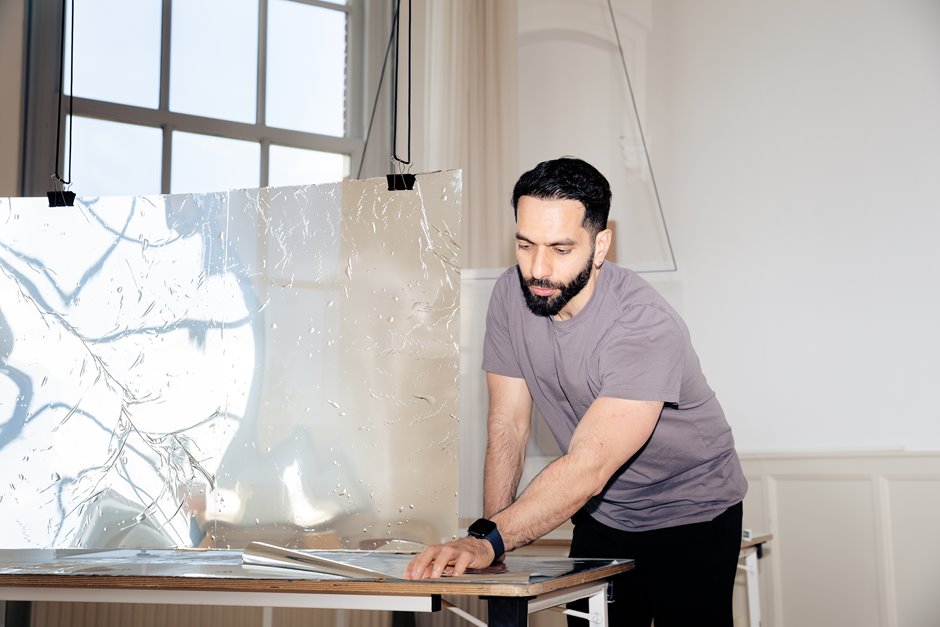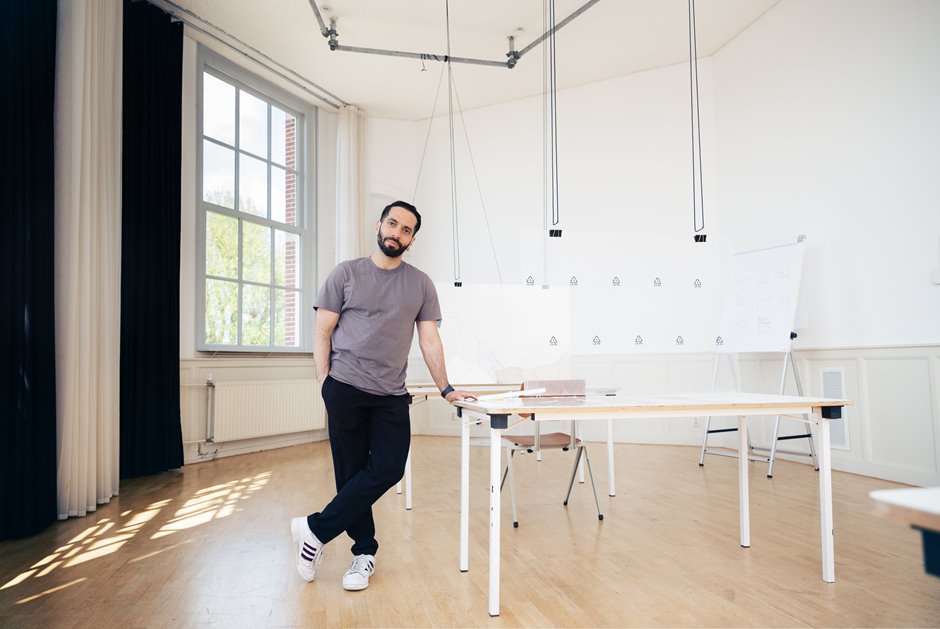Before the Dutch-Lebanese-Palestinian artist and teacher Alaa Minawi (Beirut, 1982) started his Master Scenography at HKU in 2016, he had already worked as a scenographer for several years. He mainly created light sculptures and installations. Gradually, he noticed that he didn't always want to keep producing or creating for others, but felt the urge to take a step back and reflect on his own craftsmanship. Once he had settled in the Pastoe building and started the master's course, that's exactly what he did: reflecting, contemplating, and seeing the field of scenography in a different light.
From light artist to enigmatic performer
Interview with Alaa Minawi
A transformation in the midst of your creation process: artist and teacher Alaa Minawi demonstrates that the freedom to change your mind is essential in the arts. He also questions the dynamics between the creator and the audience, and even zooms out further, posing critical questions about power structures and political systems. Often like a Wizard of Oz, invisible to his audience.

A study programme that adjusts itself organically to its students, and creators, shows a capability to reinvent itself – just like the creators. And Alaa can see this capability in the Master Scenography. Although the pressure does get increased in the second year
The thinking type
"Eventually you have to write your dissertation and present your research in a final product. That process is a lot less fluid. You need to make clear choices at this stage. Yet already during this decision process, you can make important discoveries that can serve as the building blocks for your final presentation. I didn't want my research to result in a rigid and predefined product. I am more of a thinker and researcher, rather than the type who physically experiments and works with his hands. Therefore, I went looking for ways to let my process speak for itself, instead of forcing it into a tangible, traditional form. My final product would be the research itself."
The machine
It soon became clear that Alaa would graduate with an experimental performance. However, there was still just one minor obstacle: "I discovered that I had stage fright. I wanted to conduct a performance, but I couldn't bring myself to be a part of it. From this realisation, 'the machine' was born. A machine from the year 2048, surrounded by antiseptic plastic that created a maze through which the spectator had to navigate. Inside this maze, the machine confronted the spectator with questions: it wanted to know what 'belonging' means and what it entails to ‘be part of something'."In this way, Alaa turned his audience into an intrinsic element of his work. From this moment, a series of performances followed, titled ‘2048’. Each time, the spectators become an essential part within a living and growing research project. In his fourth and most recent performative installation from the 2048 series, called “2048 - Identity in dissolution” and performed in February 2023 in Beirut, Alaa even went one step further. By deploying WhatsApp as an instrument, he encouraged his audience to go on an adventure through the city. The performance is about the notion of visibility and invisibility, and will be present in Utrecht as well during the Spring Festival ‘23.
Residency in Utrecht
When we spoke with Alaa, he had just been working on his residency at Het Huis Utrecht for a week. Here, together with other creators, he has several weeks to delve deeper into, or broaden the scope, of his artistic practice. During his residency, Alaa is exploring ways to reimagine the future through socio-political narratives. He starts by reflecting on power structures and how to reimagine them. What is the meaning of these power structures? What impact do they have? How can they be restructured, and how does this resonate within the performing arts? In October 2023, Alaa will share this creative research and process with the public.
Bio
Alaa has a Bachelor’s Degree in Communication Arts from the Lebanese American University (2008) and a Master’s Degree in Fine Arts (Scenography) from HKU University of the Arts Utrecht (2018). He also obtained a certificate at the Royal Academy of Dramatic Arts London (RADA) for educating light designers. He is a teacher at the Amsterdam University of the Arts (AHK), and professor at HKU and the Sandberg Institute Amsterdam. Additionally, Alaa is founder and programme director of the "Beirut Summer School for Theatre & Performance"